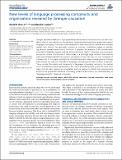New levels of language processing complexity and organization revealed by Granger causation
Author(s)
Gow, David W.; Caplan, David N.
DownloadGow-2012-New levels of langua.pdf (927.6Kb)
PUBLISHER_POLICY
Publisher Policy
Article is made available in accordance with the publisher's policy and may be subject to US copyright law. Please refer to the publisher's site for terms of use.
Terms of use
Metadata
Show full item recordAbstract
Granger causation analysis of high spatiotemporal resolution reconstructions of brain activation offers a new window on the dynamic interactions between brain areas that support language processing. Premised on the observation that causes both precede and uniquely predict their effects, this approach provides an intuitive, model-free means of identifying directed causal interactions in the brain. It requires the analysis of all non-redundant potentially interacting signals, and has shown that even “early” processes such as speech perception involve interactions of many areas in a strikingly large network that extends well beyond traditional left hemisphere perisylvian cortex that play out over hundreds of milliseconds. In this paper we describe this technique and review several general findings that reframe the way we think about language processing and brain function in general. These include the extent and complexity of language processing networks, the central role of interactive processing dynamics, the role of processing hubs where the input from many distinct brain regions are integrated, and the degree to which task requirements and stimulus properties influence processing dynamics and inform our understanding of “language-specific” localized processes.
Date issued
2012-11Department
Harvard University--MIT Division of Health Sciences and Technology; Massachusetts Institute of Technology. Research Laboratory of ElectronicsJournal
Frontiers in Psychology
Publisher
Frontiers Research Foundation
Citation
Gow, David W., and David N. Caplan. “New Levels of Language Processing Complexity and Organization Revealed by Granger Causation.” Frontiers in Psychology 3 (2012). ©2012 Frontiers Media S.A.
Version: Final published version
ISSN
1664-1078